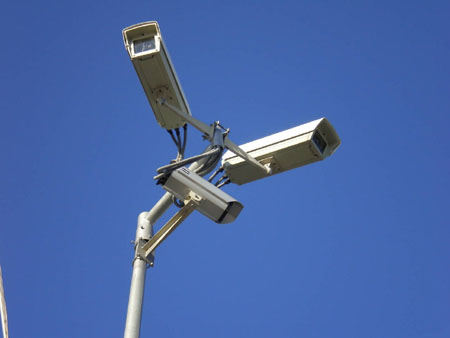by WorldTribune Staff, August 28, 2019
The ruling Chinese Communist Party (CCP) has placed more the 200 million cameras throughout China to closely surveil and track the populace.
During the ongoing mass demonstrations in Hong Kong, protesters with electric saws reportedly cut down Chinese government “smart lampposts” out of concern that the posts could identify them to mainland Communist authorities.

U.S. lawmakers are warning that Americans who travel abroad could wind up on candid camera courtesy of the CCP’s facial recognition technology, a report said.
“The technology has been deployed in Western countries as well as poorer and more authoritarian nations in Latin America, a trend that has lawmakers and analysts worried about China developing a surveillance empire on the doorstep of the United States,” the Washington Examiner noted in an Aug. 27 report.
Several nations are using surveillance systems made by Chinese companies such as Huawei, which U.S. Secretary of State Mike Pompeo and many U.S. officials believe puts malware and other technology in its equipment to enable spying at the behest of supreme leader Xi Jinping’s government.
The Chinese government mandates cooperation between high-tech companies and intelligence agencies, which Sen. Marco Rubio said raises alarming scenarios.
The Florida Republican told the Examiner that he envisions, for instance, an American executive or scientist traveling abroad for business meetings only to be detected by Chinese-made facial recognition software, which alerts China’s intelligence apparatus.
“Now you’re able to overlay your ability to hack into their computers and access their databases with knowing where they are in real time, who they’re meeting with, and get information from them that way,” Rubio said. “They know what hotel you’re staying in, they know what WiFi network you’re on. It provides them more and more opportunity for that company and that government to access your corporate information and steal it.”
Rubio, a member of the Senate Foreign Relations and Intelligence committees, added: “At its most basic level, the more you know about someone, the easier it is for you to target, leverage them, or use their information to make predictive decisions about it.
“It also allows them to target opponents of their politics. We’ve seen harassment efforts in the mainland, in the continental United States, where political opponents of what China is doing have had visits and reminders that they have relatives living in China. So imagine that with a global reach. Again, this is the tip of the iceberg.”
Rubio pointed to a recent trip to Kenya in which he said “Literally at every intersection, some picture snapped. Now they would argue that all that information is held by the Kenyans, ‘We’re just buying a product off the shelf from a company that happens to be from China.’ But the reality is that in order for that system to work and for them to design the software for it, they had to have access to government databases.”
Rubio and Oregon Sen. Ron Wyden, a Democratic colleague on the intelligence committee, have called on the State Department to issue travel warnings for the 18 countries that reportedly rely on Chinese technology for surveillance.
“Indeed, Americans need to know that repressive regimes may use Chinese-made technology to gain access to sensitive data, or that Chinese intelligence may gain access to data, even if Americans never set foot in China,” the lawmakers wrote in a letter this month to Pompeo. They noted that the countries believed to be using such technology “include Germany, which has strong privacy and human rights protections, but also Pakistan and the United Arab Emirates, which do not.”
Intelligence Brief __________ Replace The Media
